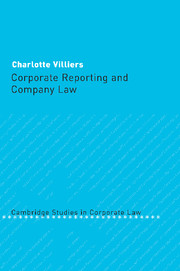Book contents
- Frontmatter
- Contents
- Preface
- Table of legislation
- Table of cases
- Introduction
- PART I GENERAL ISSUES
- PART II FINANCIAL REPORTING
- 6 Financial reporting
- 7 International aspects of financial reporting
- 8 Disclosure in securities markets regulation
- PART III NARRATIVE REPORTING
- PART IV A WAY FORWARD
- Bibliography
- Index
7 - International aspects of financial reporting
Published online by Cambridge University Press: 23 July 2009
- Frontmatter
- Contents
- Preface
- Table of legislation
- Table of cases
- Introduction
- PART I GENERAL ISSUES
- PART II FINANCIAL REPORTING
- 6 Financial reporting
- 7 International aspects of financial reporting
- 8 Disclosure in securities markets regulation
- PART III NARRATIVE REPORTING
- PART IV A WAY FORWARD
- Bibliography
- Index
Summary
Introduction
The previous chapter considered the general position in the UK with regard to financial reporting by companies. The regulatory structure and the financial reporting and accounting environment in the UK are largely guided and regulated by private and professional bodies such as the Accounting Standards Board and the Institutes of Chartered Accountants in England and Wales and in Scotland. The UK has had a long tradition of accounting and therefore has a well-developed system. Nevertheless the UK's membership of the European Union, together with globalisation of capital markets and international trade, has had a significant impact on financial reporting in the UK. In January 2005 new international standards came into force in the UK as a result of European measures to adopt standards created by the International Accounting Standards Board. This new accounting and reporting regime will have a significant impact upon business reporting in the UK and within the accounting environment there has been scepticism about the level of preparedness of companies for the new standards. This chapter will explore the European and international financial reporting rules and will consider also the impact upon companies based in the UK.
The development of an international financial reporting regime
Historically, accounting and reporting processes developed independently and have national characteristics different from those in other countries. However, an increasingly globalised economy and instant communication facilities have made necessary an international level of control of financial accounting.
- Type
- Chapter
- Information
- Corporate Reporting and Company Law , pp. 161 - 178Publisher: Cambridge University PressPrint publication year: 2006



